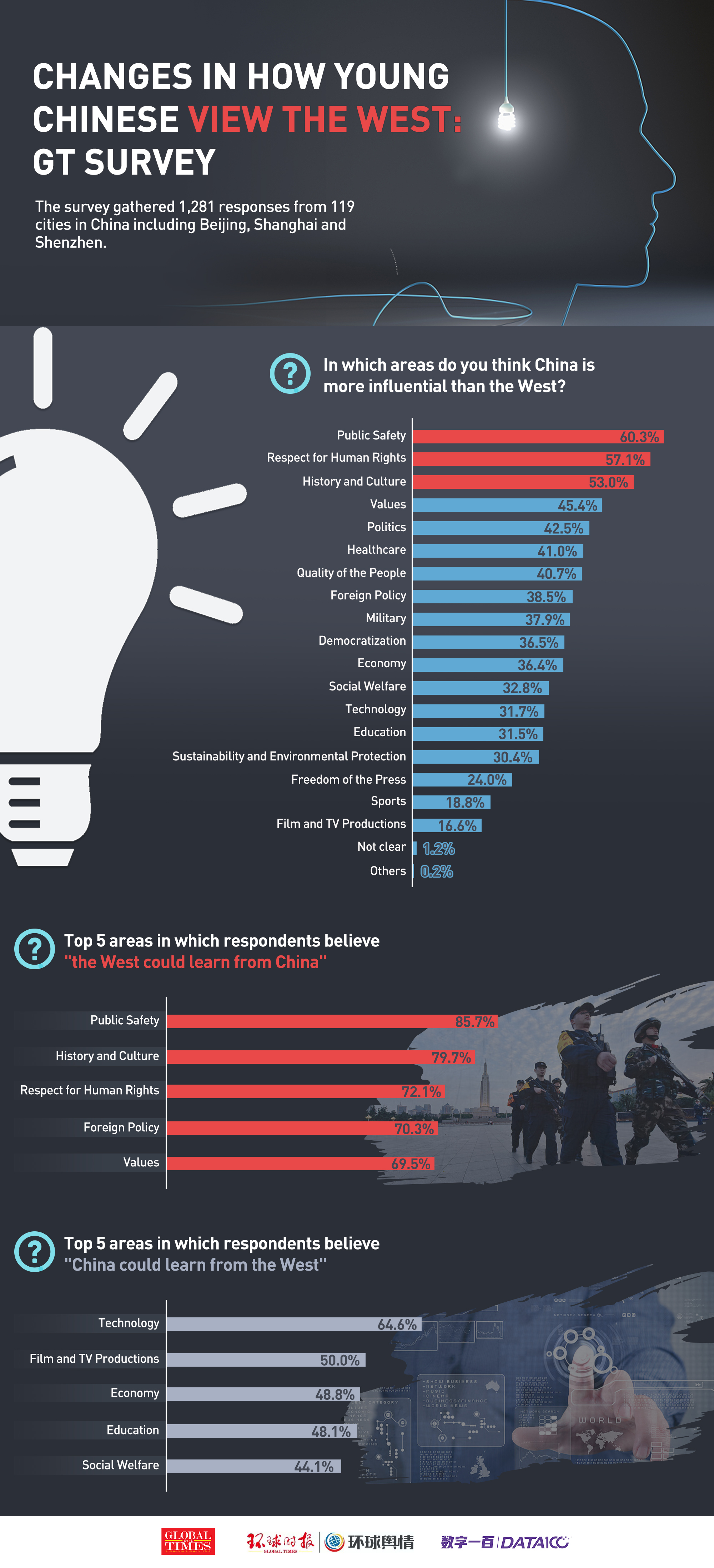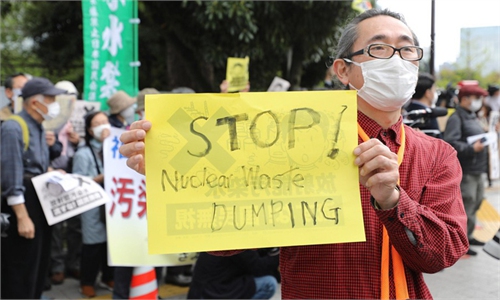GT survey shows 90% say China should not look up to West; experts say confident Chinese won’t tolerate foreign provocations

Photo: GT
Approximately 90 percent of the young Chinese participating in the latest survey conducted by the Global Times Research Center believe China should not "look up to the West" anymore, with more people in the past five years even "looking down on the West" due to multiple reasons including China's achievements in its development and the West's failed handling of the COVID-19 pandemic.
Chinese analysts said the sustainable and fast development of China is the core reason why more Chinese are becoming increasingly confident, and some key elements have sped up the process such as the rise of Trumpism in the US, which revealed shocking anti-intellectualism, racial problems and inefficiencies regarding governance among major Western countries.
The survey, titled "Changing attitudes toward the West among young Chinese people," gathered from April 9 to 12 a total of 1,281 responses covering 129 cities in the country. It showed that there has been a significant change in attitude among young people toward Western countries, as a growing number of respondents see them as equals while many previously looked up to them.
The survey showed 37.2 percent of the participants said that five years ago, they still believed they should "look up to the West," but now, only 8.1 percent of these people have the same view. Meanwhile, the people who "look down on the West" rose to 41.7 percent while only 18.4 percent of them held the same opinion as they did five years ago. About 48.3 percent of the participants believe they should see the West equally now.
The change of Chinese views regarding the West will make China more confident in handling provocations and stigmatization as the people will not accept China tolerating, compromising or remaining silent over issues of concern, said experts. The West should also learn to deal with China on equal terms, being more respectful toward Chinese public opinion rather than simply labeling increased Chinese confidence with accusations of rampant "nationalism."
Confident, not arrogant
The core reasons that have driven such changes are mostly concerned with China's achievements in recent years. For example, 53.8 percent of interviewees chose "China's successful epidemic prevention and control amid the COVID-19 pandemic," 40.5 percent selected "China's cooperation with other countries under the Belt and Road Initiative," 37.6 percent said "China is the only major economy that keeps growing when the world economy is in a shadow," and 30.3 percent picked "China's victory in the poverty alleviation campaign."
"This shows that young Chinese with international perspectives have a rational, fair and impartial evaluation of the West based on facts. Such evaluations are progressive and have made a leap in the face of the COVID-19 pandemic, when the image of human rights and freedom built by the West collapsed overnight," Shen Yi, a professor at the School of International Relations and Public Affairs at Fudan University, told the Global Times on Monday.
Chinese people had been looking up to the West since 1840 (when the Qing Dynasty was defeated by Britain in the Opium War) and such a tradition has been kept, as well as modified along with China's development. Now, increasingly more young Chinese have begun to view the West as an equal. In this case, it means both the East and the West have their own disadvantages, Shen noted.
Shen also described the past four years of governance under the Trump administration as one major reason for this equilibrium with Trump debunking the myths of the Western political system, with anti-intellectual actions from some of his supporters making the Chinese see that "the beacon of humanity" may have a first-mover advantage, but also possesses many problems.
Some Chinese students who have studied abroad, when contacted by the Global Times, said that they never imagined the response from major Western powers, including the US, UK and some European countries, toward the unprecedented public health crisis would be so irresponsible, disorganized, ineffective and anti-intellectual, with many of them extremely offended by the hatred hyped up by conservative anti-China forces against Chinese people during the pandemic.
The survey also touched upon issues including recent racial discrimination against Asian people in some Western countries like the US and Australia. About 40.7 percent of the participants said Western countries are hypocritical and unfair in their handling of racism, and 39.4 of them believe that "Westerners believe in white supremacy deep down in their hearts."
Viewing the West equally does not mean that China will be arrogant or will confront the West, Shen said. The survey also shows that the participants are realistic and rational as they are aware that the West still has advantages over China in certain fields. For example, 64.6 percent of the participants said China should still learn from the West in the fields of science and technology.
The West normally interprets "Chinese people's confidence as rampant nationalism," proving that they still look down on China and believe they can still command and lecture Chinese people, said Shen. He stressed that it is time for the US and other Western countries to face the truth, respect China, and see the country as an equal.

Graphic: GT
Declining credibility
The survey also showed that the credibility of Western media in China is collapsing. Over one-third of the respondents said they have declining trust in Western media's coverage of China, and about 28 percent said they do not trust them as they did before, while about 23.7 percent of them said they don't pay any attention to the Western media.
Further analysis of the changing attitude toward the West, from looking up to it to now seeing it as an equal, showed that over 55 percent of the respondents had declining trust in the Western media's coverage of China, according to the survey.
When asked about the constant accusations made by the US and other Western countries toward Northwest China's Xinjiang Uygur Autonomous Region on the so-called forced labor and other violations of human rights, about 77 percent of the respondents considered the accusations pure lies that were used as excuses by the West to contain China, and about 15.1 percent considered them basically true, which shows that China has certain deficiencies when handling Xinjiang affairs.
Declining public trust in the Western media has also been reflected in China's social media recently toward foreign media outlets such as the BBC. After BBC footage depicting the recovery of Wuhan, Central China's Hubei Province, from the coronavirus outbreak sparked uproar among Chinese netizens due to the addition of a grayish filter in its English version, BBC Beijing correspondent John Sudworth left the Chinese mainland and is now believed to be hiding in the island of Taiwan, after he filed a number of biased stories about China's Xinjiang policies and China's fight against the COVID-19.
Over the past few years, the BBC news channel has been showing much stronger bias toward China embedded with distorted facts, despite always claiming its neutrality and objectivity, and has become a tool for the British government to confront China, Victor Gao, chair professor of Soochow University and vice president of the Center for China and Globalization, told the Global Times on Monday.
"The China-UK relationship will go back to the normal track someday in the future, so BBC should not become so politicized and not turn itself into a blatant government tool and lose all journalistic standards," Gao said.





